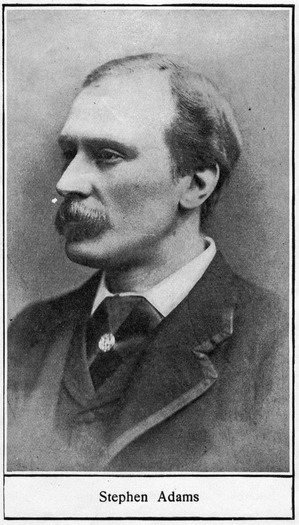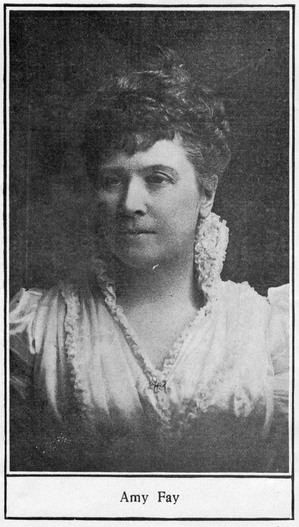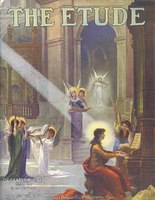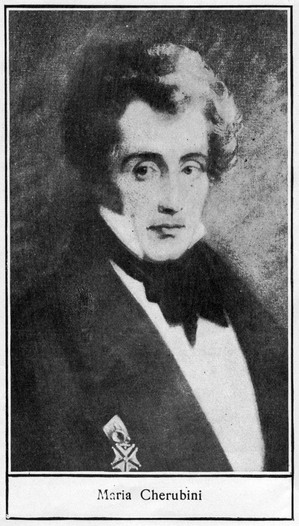 MARIA LUIGI CHERUBINI.
MARIA LUIGI CHERUBINI.
(Keh-roo-bee’-nee.)
Cherubini was born at Florence, Sept. 14, 1760, and died in Paris, March 15, 1842. He studied with his father, and others, and finally with Sarti, in Milan. For a time he travelled, visiting and for a short time residing in London, Paris and Turin, but finally he took up his permanent residence in Paris in 1786. He became Professor of Composition at the Paris Conservatoire, 1816, and was director of that institution from 1821 to 1841. His works include I figenia in Aulide, Lodoïska, Anacreon and 26 other operas, 17 cantatas, 11 masses and much sacred music. His compositions revolutionized French operatic standards, and purified them. Like Gluck, he was, in later years at all events, inspired by the highest motives and a profound master of expressiveness. Naturally his austerity did not appeal to the laughter-loving Parisians as much as the novelty of his rich orchestration and new harmonic effects, and they soon showed a preference for his pupils such as Boieldieu and Auber. As a master of counterpoint Cherubini stands supreme, and may be regarded as the legitimate successor of Palestrina. His work on the subject cannot be ignored by close students of counterpoint even to-day. Napoleon had little love for Cherubini, though he made him Chevalier of the Legion of Honor during the hundred days. The influence Cherubini has exerted on music can scarcely be overestimated.
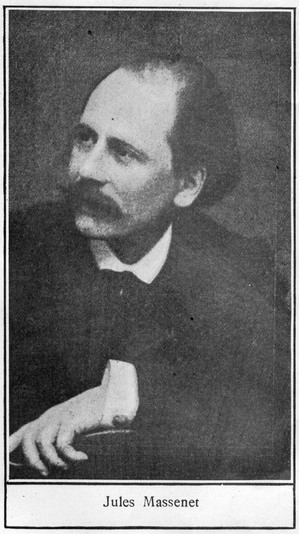 JULES EMILE FREDERIC MASSENET.
JULES EMILE FREDERIC MASSENET.
(Mas’-seh-nay.)
Massenet was born at Montaud, near St. Etienne, France. His first music lessons were received from his mother. At the age of eleven he entered the Paris Conservatoire, where he won prizes for piano playing and fugue, and eventually carried off the coveted Prix de Rome. When the government pension ceased his prospects looked gloomy—the more so because he married while abroad. However, he gave piano lessons in the winter and recitals at the resorts in summer, and when the lessons and recitals failed he played the drum in a theatre orchestra. Some orchestral suites were produced, with mild success, and after the Franco-German war his opera Doit César de Bazan made a hit, and he kept on with his operas, which include Thaïs (with its beautiful Meditation), Hérodiade, Le Cid; La Navarraise, Manon, Le Jongleur de Notre Dame, and other works familiar to American audiences, thanks to Hammerstein. He was professor of composition at the Paris Conservatory 1878-96, and is also a member of the Académie. Massenet has written over 20 operas, oratorios, a concerto, orchestral suites, etc. Some learned critics tell us that his music is “sugary” and lacking in individuality, but most people find Massenet vastly more entertaining than his critics.
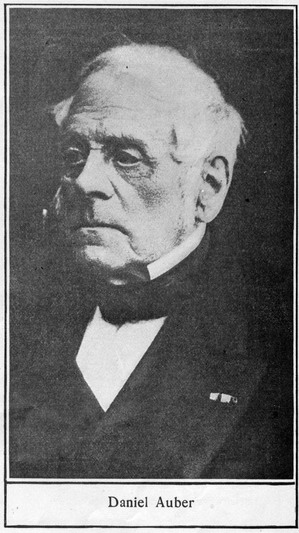 DANIEL-FRANCOIS-ESPRIT AUBER.
DANIEL-FRANCOIS-ESPRIT AUBER.
(Oh-bair.)
Auber was born Jan. 29, 1782, at Caen, France, and died in Paris, May 14, 1871. He began to compose early in life, and produced songs and “romances” at the age of eleven. He was destined for a commercial career, and sent to London a few years later. He paid little heed to commerce, and when war between England and France broke out in 1804 he returned to Paris, where he remained ever afterwards—even when the Germans besieged the city. Cherubini heard one of his operettas—his first—and was so much impressed with Auber’s genius that he superintended the young musician’s further instruction in composition. In 1835 Auber was made a member of the French Academy, and in 1842 succeeded Cherubini as director of the Conservatoire. His life was mainly devoted to writing operas, of which he composed a great number. Some of these are still produced, including Masaniello, Fra Diavolo, Crown Diamonds, etc. His style is typically French—chic, polished and sparkling. He may be regarded as the legitimate follower of Boieldieu, and superior to Hérold and Adam. As director of the Conservatoire he exercised a great influence upon the younger French musicians of his generation. In spite of his ready wit and brilliant gifts Auber was very shy as a man, and never conducted his own operas, nor even went to see them, saying, “If I were to take part in one of my own works, I should never write another note of music.”
Stephen Adams, whose real name is Michael Maybrick, was born at Liverpool, England, Jan. 31, 1834. He had the good fortune to be a pupil of W. T. Best, the great English organist, and subsequently went to Leipzig, Germany (from 1866 to 1868). While at Leipzig conservatory he studied harmony, counterpoint and composition under Dr. Richter, and pianoforte under Plaidy and Moscheles. After leaving Leipzig Stephen Adams became a pupil of Nava, at Milan, Italy. He possessed an excellent baritone voice, and shortly afterwards made his début in London, where he won considerable success. In 1884 he visited the United States and Canada, and sang some of his own songs. Many of these songs had a phenomenal success, the most popular being, perhaps, Nancy Lee, though, if this is the favorite, The Holy City runs it a close second. Other very popular compositions of his include Thora, By the Waters of Babylon, Mona and A Warrior Bold. These songs are very good examples of the English Ballad type. They have clearly defined melody, are very well suited to the voice, and are written in a way that shows that the composer is no prentice hand if no master hand. Many people think it is an easy thing to write a simple tune, until they have tried it. They then find that it is one thing to write a musical sentence which pleasingly conforms to the rules of composition and quite another to write a tune which will grip an audience wherever it is sung. This is what Stephen Adam’s has done repeatedly.
Miss Amy Fay was born in Bayou Goula, La., May 21, 1844, and is the daughter of a Protestant Episcopal clergyman, and the granddaughter of Bishop Hopkins of Vermont. After studying in Boston she went to Germany in 1869, where she had the advantage of studying with Tausig, Kullak, Liszt and Deppe. Upon her return to the United States she established herself in New York, where she has since been engaged giving lessons and recitals. Miss Fay has also done much work on behalf of the musical clubs of America, and has done valiant service in the cause of women in music. She has chiefly become known to the general public through the publication of her letters, written while she was abroad, describing her experiences in music study and her life in various German music centers. This work, entitled Music Study in Germany, has been enormously successful both in England and America. It possesses wonderful freshness and naïvete. It is a veritable self-revelation of the typical young American girl, full of enthusiasm, high spirits and sympathetic interest in her surroundings and friends. There is in it, also, a very serious interest in music for its own sake, which has not lessened as the years go on. Miss Fay has done very useful work as a teacher, and as a contributor to current musical literature.
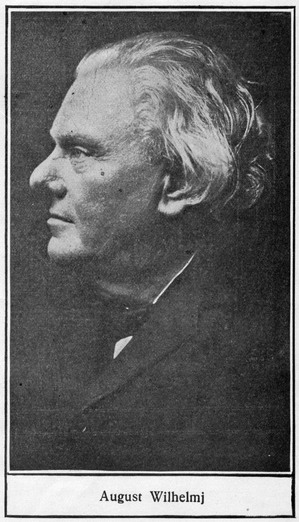 AUGUST DANIEL F. V. WILHELMJ.
AUGUST DANIEL F. V. WILHELMJ.
(Veel-hel’-me.)
Wilhelmj was born at Usingen, Germany, Sept. 21, 1845, and died in London, Jan. 22, 1908. Under advantageous circumstances his career commenced early, and after studying with Konrad Fischer he played before Liszt in 1861, who gave him a flattering introduction to Ferdinand David, the violin professor at Leipzig. After three years’ study under Hauptmann and Richter (theory) and David, he made a brilliant debut at the Gewandhaus. He also spent a year with Raff. The greater part of his life was spent in travel, touring France, Germany, Switzerland, Russia, Italy. Great Britain, Holland, Denmark, Norway, Sweden, Austria, Turkey, Italy—in fact all Europe. He was an especial favorite in England, where he eventually resided permanently, being appointed Violin Professor at the Guildhall School of Music, London, in 1894. He was greatly admired by Joachim, and was also a friend of Wagner, whom he ardently supported. In 1876 he led the orchestra at Bayreuth, and the year following brought Wagner over to London. Wilhelmj possessed great technical skill, had a rich tone, and played with a wonderful balance of intellectual and emotional force. In his latter years he played in public but little, devoting himself to the technic of violin making and to teaching his beloved art. He was, nevertheless, a familiar and dignified figure in the London musical world. His arrangement of Wagner’s Preislied is much played.


